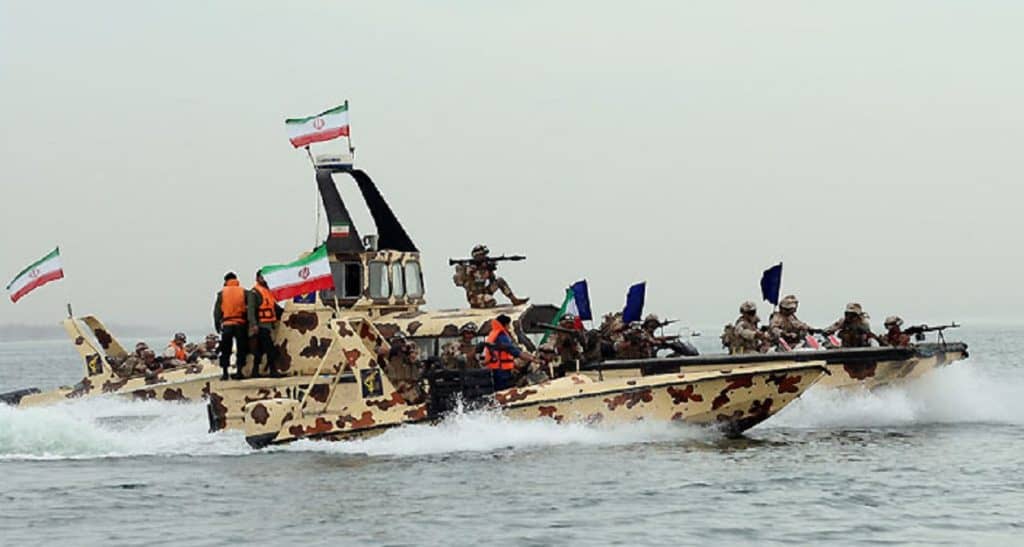World Geostrategic Insights interview with Chuck Freilich on Iran’s growing military presence in the Red Sea, Iran’s nuclear program, and increasing scope of Israeli attacks against Iran.

Prof. Chuck Freilich, a former deputy national security advisor in Israel and long-time senior fellow at Harvard’s Kennedy School, now teaches political sciences at Columbia and Tel Aviv University. He is the author of three books on Israeli national security affairs, as well as numerous academic articles, policy studies and op-eds. Chuck Freilich appears frequently as a commentator on U.S., Israeli and international television and radio stations.
– Iran is methodically basing itself in the Red Sea, with warships patrolling the southern region. “In recent months we have identified the most significant Iranian military presence in the area in the last decade,” said Israeli Defense Minister Benny Gantz. Officially, this growing Iranian interest in the Red Sea, which has been going on for a number of years, has only a security function: Tehran says the presence of its military ships is only to protect Iranian cargo ships from the risk of pirate attacks. Israel’s concern, however, is that Iran’s growing presence in the Red Sea also has other reasons. What is your opinion? What goals is Iran pursuing in the Red Sea?
Iran in the Red Sea: I don’t know of any threat from pirates that Iran faces in the Red Sea and if so this is a marginal and essentially fallacious consideration. Iran’s growing presence in the Red Sea is part of a broader strategy of spreading its influence throughout the region. The Red Sea is a vital international waterway that carries much of the world’s oil and other shipping through the Suez Canal. It is also a critical waterway for the Saudis, much of whose oil and oil infrastructure is located on the Red Sea coast and is shipped to the world through it. Israel’s outlet to the far east, a major source of all of its international trade today, is also through the Red Sea and of course Egypt and other low littoral states all have similar interests in freedom of navigation through it.
Yemen, largely under the control of the Houthis, is also a Red Sea littoral state, which is a supply line for rockets, missiles and other weapons that Iran provides them. The southern tip of Yemen, the Bab el Mandeb straits, is a chokepoint that enables control over all shipping entering and exiting the Red Sea, one of Iran’s reasons for wishing to expand its influence with the Houthis in that country. Control of Bab el Mandeb, along with Iran’s ability to control all shipping to and from the Persian Gulf through the Strait of Hormuz, means that it has the ability to shut off much of the international supply of oil and shipping generally, at will. Clearly, the international community cannot allow this to happen.
– Recently, U.S. Special Envoy for Iran, Robert Malley, said Tehran has enough highly enriched uranium to build a nuclear bomb. Malley also said the failure of the last round of talks was a “wasted opportunity,” and blamed Iran for making additional demands unrelated to discussions on the nuclear program during the latest talks. So everything remains stuck at the November 2021 positions, when talks resumed three years after the standoff began. What is your opinion? Does the possibility of an agreement still remain? Or is there a possibility of a deliberate or unintended escalation that could spiral out of control? What is Israel’s position on this issue?
Iran-nuclear: Iran has now refused to reach a deal, and part of the time even to negotiate, for the 18 months since the Biden administration came into office and first expressed its great interest in a return to the old deal. Iran is very unlikely to get a better deal than what Biden has been willing to offer. It is thus increasingly questionable whether Iran, under the hardline Raisi government, and especially under the guidance of the Supreme Leader, is really interested in a return to the old deal.
Ever since Trump’s catastrophic decision to withdraw from the nuclear deal, Iran’s nuclear program has advanced rapidly and it now has enough fissile material (highly enriched uranium) for a first bomb, a few more within about two months and five within six months. The good news is that, to the best of our knowledge, Iran still needs a year or two to develop the warhead necessary to place a bomb on a missile. Iran has been in a “holding pattern” regarding the warhead for approximately 20 years now, so apparently the decision-makers in Tehran believe that weaponization would be a bridge too far, one that would likely invite outside attack. But they could try to do so covertly and in any event 1-2 years is not much.
The Biden administration is still committed to a return to the previous deal, but with just 4 ½ years left to the primary restrictions the deal imposed, it is becoming a decreasingly important mechanism. That is why Israel apparently sought to convince the administration, unsuccessfully, to pursue a new deal that would be both longer and more stringent in its limitations. However, unless the US and international community are willing to impose the kind of extreme sanctions on Iran that have been imposed on Russia in recent months, the chances that it would agree to this are minimal. If it has been unwilling to agree to the limitations imposed by the old deal, it is hard to see why it would agree, in the absence of such extreme pressures, to a deal which would be worse for it.
I don’t believe that anyone at the moment wants a significant escalation, beyond the growing covert blows that Israel and Iran are reportedly exchanging. Israel is trying to restore its military option to attack and significantly set back the Iranian nuclear program, but needs some years for this, which is why it is focusing on covert operations. Iran is successfully expanding its influence in the region, especially its massive supply of rockets and missiles to Hezbollah and other allies in the region, and apparently sees no reason to do anything that would risk this at this time. The US is totally preoccupied by Ukraine, Russia and China, and is certainly uninterested in an escalation at this time. Having said that, when blows are exchanged, even when intentions are limited, unintended escalation is always a possibility. Israel, for its part, cannot allow Iran to continue its nuclear and other activities unimpeded and must do what it can to prevent their continuation.
– Israel has intensified the scope and frequency of its attacks in Iran. “The security breaches inside Iran and the vast scale of operations by Israel have really undermined our most powerful intelligence organization,” said Mohammad Ali Abtahi, former vice president of Iran. In addition, according to Iranian media. Keren Hajioff, a senior adviser to Naftali Bennett, said the strategy against Iran is part of the ‘octopus’ doctrine,” a strategic shift from the past, when Israel focused on Iran’s ‘tentacles’ throughout the region, in Lebanon, Syria and Gaza.” The new tactic, he added, is “a paradigm shift: now we are going straight for the head.” What is your view? What tactical and strategic goals is Israel trying to achieve through increasing the operations of its intelligence directly inside Iran?
Increase in scope of Israeli attacks: I am not sure the paradigm shift is quite so significant. Israel has reportedly waged a covert campaign against Iran for many years, but it does appear to have increased the tempo and expanded the range of attacks to some degree in recent months.
Israel quite simply cannot allow Iran to go nuclear, a potentially existential threat, and Iranian expansionism throughout the region poses direct threats to critical interests (e.g. shipping in the Red Sea), or to Israel’s very security, through the mammoth rocket arsenal that Iran has supplied Hezbollah and the smaller but still quite significant numbers of rockets and other weapons that it has supplied Palestinian Islamic Jihad and Hamas in Gaza. Iran, along with these allies, is also the primary source of the vast number of cyber attacks conducted against Israel.
Iran is the greatest threat to Israeli security today and I believe the biggest and most dangerous adversary Israel has ever faced. Iran is simply too far away, too big and too powerful to be defeated. Israel can defend itself quite effectively against Iran, I don’t lose too much sleep over that at night, but defeating Iran, which is a regional superpower, is likely beyond its reach. Understandably, Israel does not want to go head-to-head with Iran and so has reportedly focused on covert operations, mostly kinetic, some cyber.
The various operations, primarily those directed against the nuclear program, have the important effect of delaying Iran’s efforts. Repeatedly gaining time is critical and provides Israel, the US, other actors, with the opportunity to address the Iranian threat through a variety of means. The downside is that it is just a delay, it doesn’t solve the problem. That is why I believe that it is in Israel’s interest to return to the old deal, which still provides a significant period of time, and especially to try and get the international community on board with the idea that as the deal’s end approaches, it must be made clear to Iran that its primary limitations will actually continue in perpetuity, or a new deal must be reached.
Prof. Chuck Freilich – Former deputy national security adviser in Israel.







